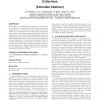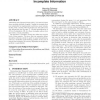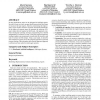ATAL
2010
Springer
14 years 22 days ago
2010
Springer
ATAL
2010
Springer
14 years 22 days ago
2010
Springer
We demonstrate a "Companion" ECA, which is able to provide advice and support to the user, taking into account emotions expressed by her through dialogue. The integratio...
ATAL
2010
Springer
14 years 22 days ago
2010
Springer
In many AI settings an agent is comprised of both actionplanning and action-execution components. We examine the relationship between the precision of the execution component, the...
ATAL
2010
Springer
14 years 22 days ago
2010
Springer
A dynamic model of a multiagent system defines a probability distribution over possible system behaviors over time. Alternative representations for such models present tradeoffs i...
ATAL
2010
Springer
14 years 22 days ago
2010
Springer
Alternating-time Temporal Logic (ATL) [1] is used to reason about strategic abilities of agents. Aiming at strategies that can realistically be implemented in software, many varia...
ATAL
2010
Springer
14 years 22 days ago
2010
Springer
In many applications, tasks can be delegated to intelligent agents. In order to carry out a task, an agent should reason about what types of resources the task requires. However, ...
ATAL
2010
Springer
14 years 22 days ago
2010
Springer
We consider the issue of representing coalitional games in multiagent systems that exhibit externalities from coalition formation, i.e., systems in which the gain from forming a c...
ATAL
2010
Springer
14 years 22 days ago
2010
Springer
We consider the problem of allocating networked resources in dynamic environment, such as cloud computing platforms, where providers strategically price resources to maximize thei...
ATAL
2010
Springer
14 years 22 days ago
2010
Springer
Video games provide a rich testbed for artificial intelligence methods. In particular, creating automated opponents that perform well in strategy games is a difficult task. For in...
ATAL
2010
Springer
14 years 22 days ago
2010
Springer
The Restaurant Game demonstrates an end-to-end system that captures and generates social behavior for virtual agents. Over 15,000 people have played The Restaurant Game, and we ha...






